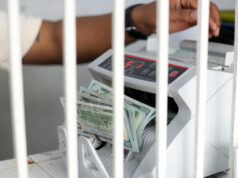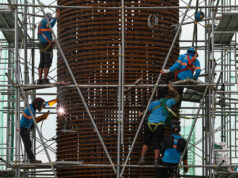JFC allots P7B for business shake-up
JOLLIBEE Foods Corp. (JFC) will be spending P7 billion for its rationalization efforts across its businesses worldwide in 2020, including its move to bolster digital capacity, as it grapples with the impact of the global coronavirus disease 2019 (COVID-19) pandemic.
In a disclosure to the stock exchange Friday, the fast food giant said it assumes that consumers around the world will “not quickly revert to pre-COVID 19 behavior” after quarantine measures and other forms of restrictions are lifted in various countries.
“It is again time to embark on another business and organization transformation in response to changing consumer behavior caused by the COVID-19 pandemic,” JFC Chief Executive Officer Ernesto Tanmantiong was quoted as saying.
JFC said it seeks to invest in digital commerce and technology this year, increasing its capacity for delivery-to-home and office, take-out and drive-thru transactions, and installing mobile applications to facilitate food ordering and payment.
The company noted its home and office delivery business continues to grow “significantly,” citing Smashburger’s delivery sales growth of 600%.
It is also eyeing to foray into cloud kitchen, or unmarked delivery outlets with no dine-in facility located in discreet, low-rent sites.
The listed company intends to introduce rationalization measures in a number of its restaurants in various markets, resources, and production and distribution facilities.
Also, it plans to enforce changes in support and management groups in the field and in the offices, as well as to implement strict safety protocols in its stores.
The global pandemic caused temporary closures of many of the fast food giant’s stores across the world, “dramatically” reducing dine-in sales at restaurants, JFC Chief Financial Officer Ysmael V. Baysa said.
In March, JFC slashed its capital expenditure by 63% to P5.2 billion from P14.2 billion, halting about P9 billion worth of spending activities until 2021 due to constraints to the construction of facilities and to the uncertain volume of demand given the limited mobility of consumers.
It likewise cut operating costs in all business levels across its main offices worldwide.
However, JFC is still pursuing expansion activities on a “very selective basis,” expecting to open a total of 171 company-owned new stores and renovate 96 existing stores in the year.
“In the next few months, even as lockdowns begin to be lifted, we forecast that sales will continue to be much lower than year-ago levels. Our estimate is that our profit for 2020 will not be good at all due to the overall economic environment,” JFC Chief Financial Officer Ysmael V. Baysa said.
“We are taking this opportunity to implement truly major changes in 2020 so that JFC will start 2021 in a much stronger position in terms of business model, operating efficiency, profitability and organization strength. We will then resume strong and consistent profitable growth for the years ahead,” he added.
Despite an “extremely challenging year,” JFC Chairman Tony Tan Caktiong said he remains optimistic that the company will emerge in 2021 as an “even stronger business and organization.”
The expense provision for JFC’s business shakeup will be set up in the second quarter.
On Friday, shares in JFC fell by 2.56% to close at P133 each. — Adam J. Ang



